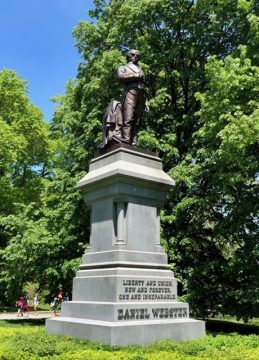by Michael Liss
 There is a statue of Daniel Webster in Central Park. It is tucked in at the intersection of West and Bethesda Drives, massive and unmoving, implacable and forbidding. Despite its size, it goes largely unnoticed, except as a meeting point.
There is a statue of Daniel Webster in Central Park. It is tucked in at the intersection of West and Bethesda Drives, massive and unmoving, implacable and forbidding. Despite its size, it goes largely unnoticed, except as a meeting point.
Just a few hundred feet to the west of Webster is The Dakota, where John Lennon lived and died, and Strawberry Fields, a small memorial inside the Park dedicated to Lennon’s memory. In non-viral times, buses line up near The Dakota, and platoons of tourists pause there for pictures, then walk to Strawberry Fields, then across to Bethesda Fountain. If you happen to be jogging, they will wait until you pass, many with bemused looks at the strange beings who inhabit this odd corner of the universe. Occasionally, a guided tour will take brief note of Webster, but most move on. Such is fame.
It wasn’t always this way. There was a time when Daniel Webster was seen as a giant, one of the foremost statesmen of the first half of the 19th Century. He, along with Kentucky’s Henry Clay and South Carolina’s John C. Calhoun, were known as the Great Triumvirate of the Senate. All three also served as Secretary of State; all three ached for the Presidency and never quite got there; all three were antagonists, rivals, and sometimes collaborators. Clay was the Great Compromiser. Of Calhoun, the historian Richard Hofstadter said he was “probably the last American statesman to do any primary political thinking.” Webster was an orator so esteemed that Stephen Vincent Benét had him besting the Devil himself.
These qualities all came together in one of the most fascinating and consequential debates in our history, South Carolina’s drive for Nullification, and, eventually, its assertion that it had the right to leave the Union. William F. Freehling called it a “Prelude to Civil War” (in a book of the same title) and, in its issues and its sectional animosities, one can see why. It certainly had high drama—florid speeches, torchlight parades, marching and mass rallies, dueling, armed militias drilling, and the glowering presence of the biggest personality of all, Andrew Jackson. Read more »
